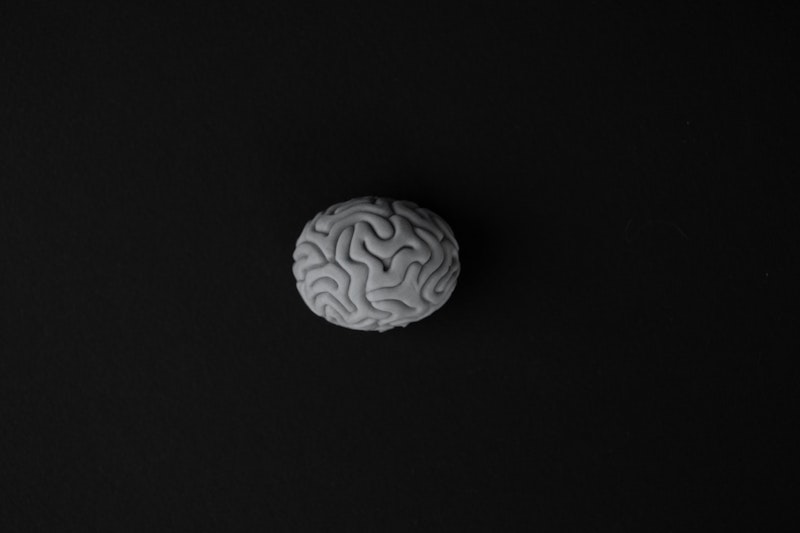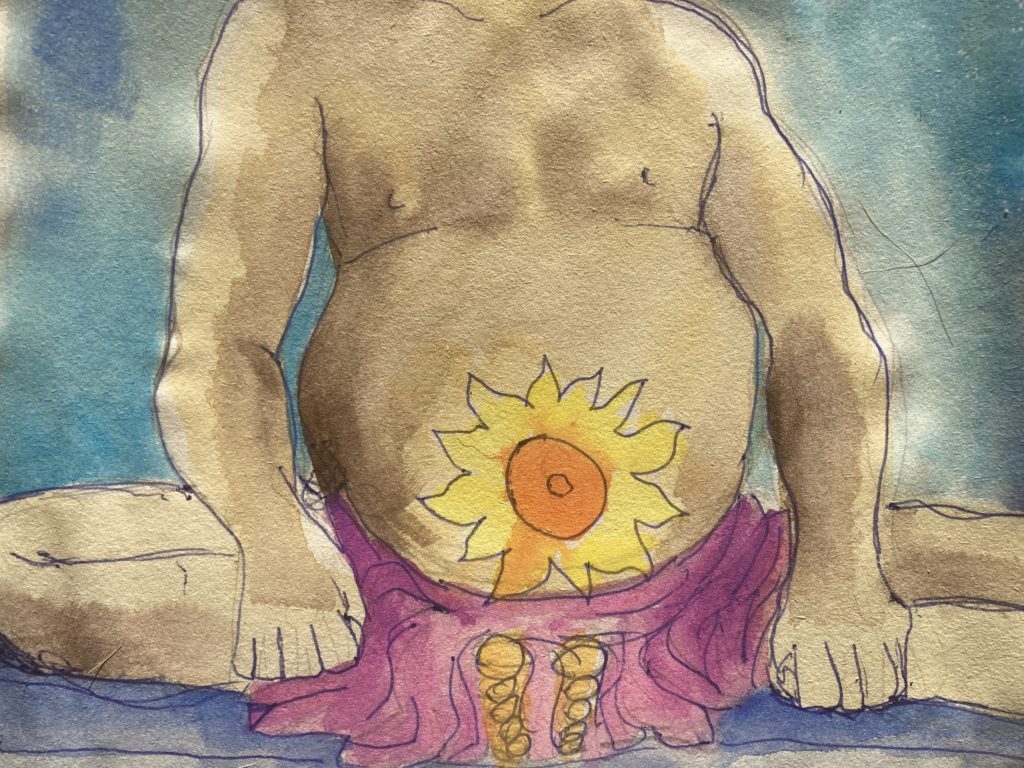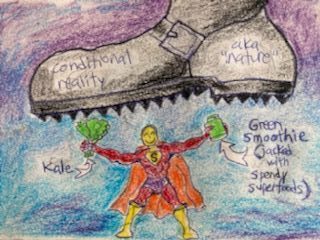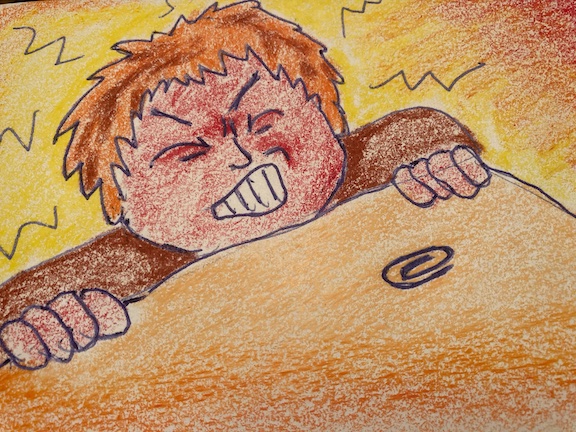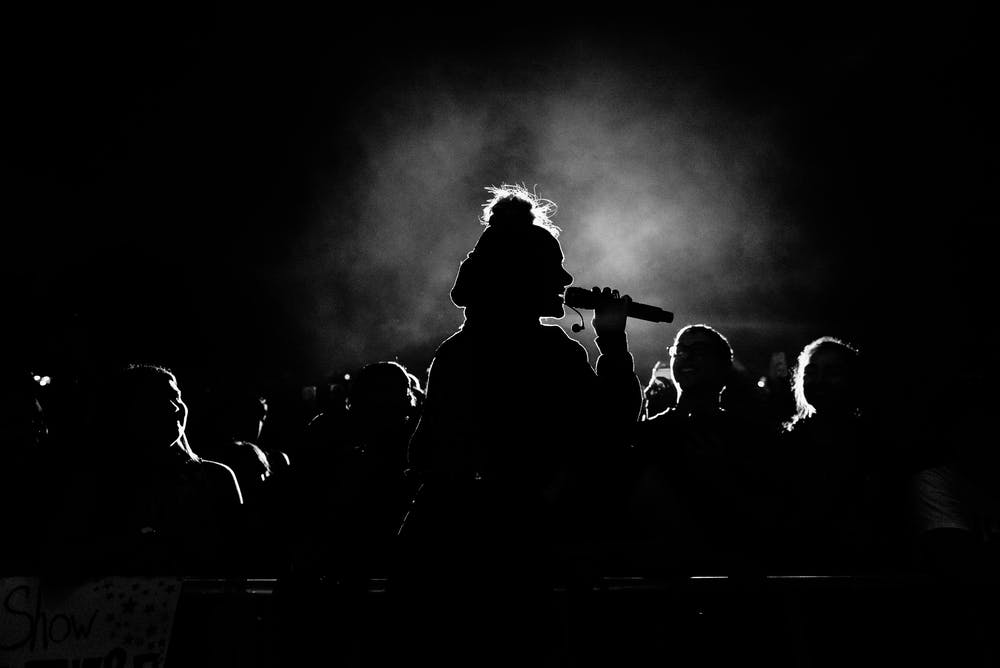Spousal Bad Moods and the Secrets of True Nourishment

Last night my wife, Carolyn, plunged into a stormy mood. Gazing darkly into the middle distance, she said that her latest novel, the one she’s been toiling away on for the last three months, was falling apart. The novel, she said, is catastrophically flawed. At its very core. All is lost. Also, she added, it wasn’t just this novel; she’d lost the ability to write forever.
Carolyn is a wildly successful novelist and meltdowns of this kind are a normal part of her novel-writing process. Nevertheless, they freak me out every time. And last night was no different.
I tried to hide my freak out, to do Good Husband Shit. I listened intently. Tried meekly to offer encouragement. Took the front paws of one of our cats, chubby Oblio, in my hands, and moved them around while talking in a funny Oblio voice, as if he was giving her encouragement. Offered to help her work through the structural problems in the novel using my trusty white board.
But inside I was panicking. Hurtling into an abyss. I felt like I was sliding into a roaring Coen brothers wood chipper.
On the psychological level, I react this way because, when I was a kid, my father was a raging abusive alcoholic. And in that sea of chaos and fear, my mom was my only life raft. I mean, all kids are emotionally dependent on their moms.
But when a kid’s dad can turn into a pyrotechnical maniac, that kid’s Mom-bond turns into much more of a desperate, life-and-death-ish thing. So when Mom would “vanish” into her depressions, it felt absolutely life-threatening to little-boy-me. And Carolyn’s moods, infrequent though they are, activate those exact memory programs in my body. Intensely. Vividly. Some real Pixar-level shit.
But on an even more primal level, what happens when Carolyn plunges into a gnarly mood is I feel completely cut-off—not just from “Mom,” but from Life, from Source, from Fundamental Nourishment. And this is ego stuff.
Adi Da has always taught that the ego is an action, a present-moment activity—not a “thing.” He says that in reality, the Radiance of Conscious Light is all there is. That Field of Infinite Life is our true identity right now and always.
Sadly, though, we do not know this. According to Adi Da, this is because, on some deep, existential level, we chronically “contract from” the Radiance of Conscious Light, and presume ourselves to be these separate entities, these jiggling mortal bodyminds. And the fundamental “mood” of all separate, jiggling, mortal bodyminds is: “You don’t love me.” Adi Da says,
“Thus, ‘I/me-apart’ is felt as ‘you don’t love me’ and therefore lives as unlove, as ‘I don’t love you.’… And all of that interpretation is based on the feeling that we are not sustained. In other words, independent existence itself is felt as separation from the ultimate food source.”
“[The conventional person] is cut off from his food source through the presumptive recognition of his separate existence, of his mortality. He feels unloved. He is a dangerous beast. He is in conflict with himself, struggling, looking for a way to be permanently sustained.”
“All of our conventional efforts in life are searches to be permanently, absolutely, unqualifiedly sustained, to be fed perfectly and eternally and to be simply happy, kept alive by whatever put us into existence to begin with. But until we make our connection with food or with sustenance, we are mad. Since sustenance is scarce, we threaten one another. We live like beasts! If we get a little bit that sustains us, we become anxious about sustenance, we cannot get enough. We overeat, or we overseek. We are always believing the logic that we are not sustained, that we are cut off from the source, that we are not loved, that what essentially and permanently and absolutely can sustain us is something from which we are separated….”
“Thus, we must ultimately deal with this metaphysics, this philosophy that ‘I am not loved,’ that ‘I am separate from what sustains me.’ The whole drama of human existence is about that feeling of separation, and that is all that it is about.”
Adi Da teaches that if we dare to become extraordinarily sensitive we will discover that the feeling of being disconnected from that which sustains and nourishes (and, consequently, the mood of “you don’t love me”), is there, in the background, in every moment. But certain situations can cause it to suddenly flare up more dramatically into the foreground (“These go to 11”). Situations like, say, one’s wife tumbling into a bad mood, a mood from which she can’t be dislodged even by the encouragement of a chubby gesticulating cat.
Adi Da teaches that, having egoically contracted from the Sea of Conscious Light—and, thereby, cut ourselves off from the primordial power of Love-Bliss that, in truth, not only “feeds us,” but lives, breathes, and is us—we then project our existential sustenance “out there,” onto all sorts of goofy shit. People (usually intimate romantic partners), food, and money are probably the most common of these surrogates.
Of course, money, food, and intimate relationships can sustain and nourish us in very real and potentially beautiful ways. But they can never provide the deep, whole-bodily voluptuousness of being continuous with the Divine Spirit Power, the free force of Love-Bliss, the matrix of Radiant Eternal Life.
By comparison to that real sustenance—the nectar of the Living God Light—the sustenance of food, money, and romantic partners is a very simple, functional matter. And happily, the more intimate we are with our real sustenance, the more free, delightful, and playful our relationships with food, money, and our loved ones become. Because we are not burdening them with craven and desperate need. At that point, we can be of actual service to our intimate partners when their novels are disintegrating.
And I guess it goes without saying that Awakening to our true condition, as the Divine Spirit Power, is what Spiritual life and practice is all about.
“[But] is it true that we are actually separated from sustenance? It is very important to find this out, because everyone simply and mechanically presumes that it is true. The vulnerabilities of childhood reinforced that presumption. All this social habitual learning that comes out of childhood and adolescence and into your later life supports this essential metaphysical view that we are unloved, that we are separated from what sustains us in the absolute sense, that we are mortal.”
“The more we meditate on being unloved, the less we live as love. If we allow ourselves to feel our Condition, to feel asour Condition, to feel completely our Condition in this moment, can we discover any separation from anything whatsoever? Are we anything that can be separated, that is separate, that is an anything when viewed as a totality?”
“Obviously this is the essential consideration that I entertain with you through My Teaching. If you could simply feel your Condition, feel as your Condition in this moment without obstruction, without making an interpretation, then you would not any longer be what you already are being. In that case, you would not be in the condition of obstructed feeling-attention, defining yourself, feeling vulnerable, separate, a being. You would directly and intuitively discover the nature of your Condition, which in no sense is separated out, which is pure, absolute energy without qualification, which is sustained absolutely, which was never separated from anything, which does not exist in an inherently separated state.”
In closing, here’s what I can say about this. My therapy, and healing my PTSD, is helping me to open to and trust the Grace and Blessing Power of my Guru, Adi Da Samraj. And that Grace and Blessing Power is drawing me into some sort of new relationship to those “memory states” that Carolyn’s occasional bad moods activate in my nervous system. In other words, those memory states are definitely not gone (as last night demonstrates). But they’re much softer than they used to be. And I have a more spacious sense of humor about them. Because my very cells feel more and more the “hum” of the Mystery in which we all truly rest. That’s plenty. I feel all kinds of grateful.
Subscribe! Just think how nurtured, nourished, and sustained you could feel by subscribing to this nutritious blog! And how nurtured, nourished, and sustained you’d make little ole’ me feel by subscribing! Win-win, baby! Somewhere on this page there’s a subscribing button-ish thing! Just for you!

